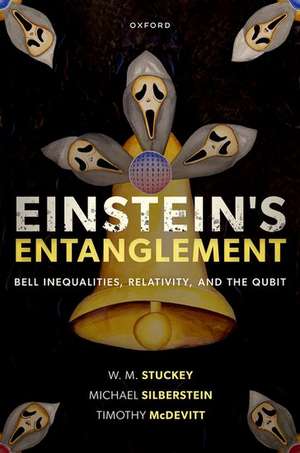Einstein's Entanglement: Bell Inequalities, Relativity, and the Qubit
Autor W. M. Stuckey, Michael Silberstein, Timothy McDevitten Limba Engleză Hardback – 27 aug 2024
Preț: 360.21 lei
Preț vechi: 389.66 lei
-8% Nou
Puncte Express: 540
Preț estimativ în valută:
68.96€ • 70.92$ • 57.21£
68.96€ • 70.92$ • 57.21£
Carte disponibilă
Livrare economică 18-24 ianuarie
Livrare express 14-18 ianuarie pentru 72.58 lei
Preluare comenzi: 021 569.72.76
Specificații
ISBN-13: 9780198919674
ISBN-10: 0198919670
Pagini: 320
Ilustrații: 83 line illustrations and 2 halftones
Dimensiuni: 163 x 240 x 20 mm
Greutate: 0.73 kg
Editura: OUP OXFORD
Colecția OUP Oxford
Locul publicării:Oxford, United Kingdom
ISBN-10: 0198919670
Pagini: 320
Ilustrații: 83 line illustrations and 2 halftones
Dimensiuni: 163 x 240 x 20 mm
Greutate: 0.73 kg
Editura: OUP OXFORD
Colecția OUP Oxford
Locul publicării:Oxford, United Kingdom
Recenzii
Presents a compelling and interesting novel approach to making sense of quantum mechanics.
Mark Stuckey and his co-authors perform a rigorous reconstruction of quantum theory, drawing inspiration from the elegant axiomatic foundations of special relativity in Einstein's Entanglement. At the centre of the authors transformative principle is an information-theoretic interpretation of the quantum state that unravels many counterintuitive aspects of quantum theory in an appealing and natural way.
Einstein's Entanglement is an engaging introduction to all-at-once physics, offering a simple and compelling new axiomatization of quantum mechanics, which demonstrates the power of the all-at-once approach while also revealing intriguing connections with special relativity.
Stuckey et al. have been doing "all-at-once" physics since before it was cool. Their use of a simple principle, treating past and future in the same manner, looks like a great starting point for making sense of quantum entanglement.
Written at a relatively elementary level, this insightful and engaging treatment of quantum entanglement shows how an information-theoretic approach inspired by Einsteinâs methodology in the special theory of relativity can demystify what Schrödinger called the characteristic trait of quantum mechanics, making the departure from classical thinking more natural and comprehensible.
Mark Stuckey and his co-authors perform a rigorous reconstruction of quantum theory, drawing inspiration from the elegant axiomatic foundations of special relativity in Einstein's Entanglement. At the centre of the authors transformative principle is an information-theoretic interpretation of the quantum state that unravels many counterintuitive aspects of quantum theory in an appealing and natural way.
Einstein's Entanglement is an engaging introduction to all-at-once physics, offering a simple and compelling new axiomatization of quantum mechanics, which demonstrates the power of the all-at-once approach while also revealing intriguing connections with special relativity.
Stuckey et al. have been doing "all-at-once" physics since before it was cool. Their use of a simple principle, treating past and future in the same manner, looks like a great starting point for making sense of quantum entanglement.
Written at a relatively elementary level, this insightful and engaging treatment of quantum entanglement shows how an information-theoretic approach inspired by Einsteinâs methodology in the special theory of relativity can demystify what Schrödinger called the characteristic trait of quantum mechanics, making the departure from classical thinking more natural and comprehensible.
Notă biografică
W. M. Stuckey earned a Ph.D. in physics with a thesis in general relativistic cosmology under Louis Witten at the University of Cincinnati in 1987 and is now a Professor of Physics at Elizabethtown College. In his 36 years there he has taught numerous courses in physics to include quantum mechanics, special relativity, general relativity, and foundations of modern physics. In addition to his work in foundations of quantum mechanics, he has published journal articles on cosmology, dark matter, dark energy, and general relativity.Michael Silberstein is Professor of Philosophy at Elizabethtown College, Director of the Cognitive Science Program, and a Core Neuroscience Faculty member. His primary research interests are foundations of physics, foundations of cognitive science, and the science of consciousness. He is also interested in how these branches of philosophy and science bear on more general questions of reduction, emergence, and explanation. His two most recent book with OUP are Beyond the Dynamical Universe (2018) and, Emergence in Context (2022), with Robert Bishop and Mark Pexton.Timothy J. McDevitt earned a PhD in Applied Mathematics from the University of Virginia in 1996 studying the deformations of elastic shells. He has worked in academia for 24 years, but he also spent time in the employment of the US government, and he was a Congressional Fellow in 2021-2022 for the American Association for the Advancement of Science representing the American Statistical Association. Tim especially enjoys interdisciplinary research and he has published articles in cryptology, engineering, math, medicine, philosophy, and physics.
